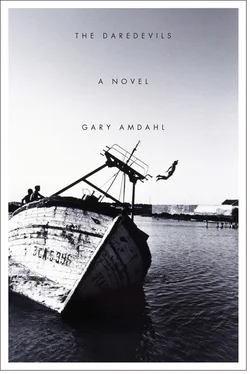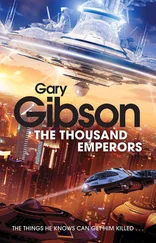“I’d take the waffle,” said the other man, “but who needs a Minerva? You gotta shut the engine off every time you come to a stop, don’t you?”
The mechanic nodded and belched. Charles thanked him for his help, left the shop, and made his way as near to Market Street as he could get. Walking through dense and happy crowds waving flags, he heard a marching band. Climbing five flights of stairs, he came to the last door and stood before it. He knocked and waited. Knocked a second time and continued to wait. Then opened the door and stepped into the sunlight. There were enough people on the roof to make it impossible to see everyone at once, and he paused on the threshold. There, he saw that everyone he could see was looking at him.
He knew they were looking at nothing, at an actor, and was untroubled.
He saw Vera, deep in conversation with the woman he had met the night Farnsworth had beaten her up. Talking to the woman but looking at him.
She saw Charles see her and looked away.
His heart began to thump — insisting he was something — as he searched the crowd for Warren Farnsworth and his sworn agency of death. How Farnsworth’s jealous wrath could prevail, even survive, in the face of a mass murder only days old, Charles did not know. Appraised calmly, from a crucial but not necessarily great distance, it was impossible to countenance. No sane man would kill another who had just survived a bomb blast over a sexual matter. Remove that distance, though, and place your mind back onstage with the carnage, with the severed limbs, the rolling, rocking heads coming to a stop in the limelighted pools of brilliant, smoking, crimson, still-spreading blood, the heaps of intestine and organ meat that had been actors draped like bunting on the furniture or fallen like confetti on paraders. and whether or not you thought they could be replaced and that the show would go on, as everything was replaced and every show went on, and that terror was ordinary and that there were no sane men, not in the moment of the act as every moment was a moment of an act, there, on the stage, you saw that everything was possible and that the only way to go on was to see that you were some kind of nexus of nothing, or nexus of everything, if you preferred, and therefore immortal. In other words, Warren Farnsworth could very easily step up and stab him in the heart, or — how had Father’s Montaigne put it? — make a person repent by killing them?
He saw “Owl,” Tom Moody, who was wearing a large sombrero, talking to a Mexican gentleman he had seen before, and Moody’s wife, Minnie, but no sign of Farnsworth. He moved to the edge of the roof, where people were lining up and leaning over the wide stone parapet, watching the miniature paraders below draw slowly nearer and nearer. Then the entire street was alive, as with a single undulating thing. As far as he could see in either direction, the street was filled with tight formations of marchers, throbbing with manifestations here and there of the great power of crowds and parades, colors flickering and changing, the formations seeming to move without moving, little flutterings on the edges and deeper within the only evidence of propulsion. The noise was now steady and loud enough to cause the people nearest him to speak up and lean together, nodding emphatically at everything they heard and said to each other. Distant whistles and cheers and rolling hurrahs rose and fell in the flux of sound churning below them. The first band disappeared in the southwest and a second appeared in the northeast. Slowly it made itself heard. Banners swayed with the labored gaits of their holders and with the wind, which came and went pleasantly. Keogh and his cavaliers had been at the head of the parade, and Charles had not seen them. Someone he didn’t recognize was taking pictures, endowing himself with what would later be a priceless collection of photographs: influential and sometimes infamous San Francisco radicals laughing and goofing around and looking, if you didn’t know who they were, like picnickers. Walking among the crowd — everyone nodding politely and sometimes smiling gently — he saw the tall fair man who had so disliked Dickens and Dostoyevsky — and Hardy, he sputtered to himself with faint but real hysteria in his inner voice, how could ANYONE NOT LIKE THOMAS HARDY? — and listened to him tell a story about himself and, if Charles understood correctly, Jules, kidnapping the obnoxious son of the headmaster of their private school, binding and gagging the boy and locking him in the basement of a summer home in Watch Hill, Rhode Island, leaving him there and being delayed in their return by a hurricane. The Mexican gentleman, he learned, was preparing to leave San Francisco, to meet his brother in St. Louis, where together they would raise funds for the defense of a third brother, who was still in prison in Mexico. These were men, he was told by the woman whom he’d seen huddled with the now-vanished Vera, the likes of which you could not find outside of Mexico and Russia, men who gave up wealth and power and privilege to help the downtrodden.
“You won’t find them in America,” said the woman, “that’s for sure.”
“No,” said Charles, edging away, “you sure won’t.”
“No indeed,” she confirmed, following him. “In America, you find ‘the American,’ don’t you?”
“Yes,” he said. “I think that’s safe to say. I’m not sure why you think you have to say that to me now, but—”
“Look,” said the woman, “I’m not going to bite you. I’m as horrified as I can be.”
“I’m sure everybody is horrified. Perhaps only the bomber himself is not.”
The woman’s lip, her whole lower jaw, began to tremble. Her eyes without warning clouded with tears and reddened.
“I happen to think the bomber is not excluded from horror.”
The woman sniffed and choked when she tried to speak. “I am so sorry. We, I, none of us, we never never hated you.”
“I can assure you that I do not feel hated, and never have done.”
“No, no, no,” sobbed the woman without moving her face. “Hate is so, so, so wrong.”
Impassively, slowly, carefully, Charles reached into the pocket of his jacket and gave the woman a handkerchief. She dabbed at her eyes and blew her nose, handed it back, smiled.
“We love ‘the American.’”
“I am sorry to say I never learned your name, after all we’ve been through.”
“Lucy.”
“Where,” asked Charles, “did Vera get off to?”
“I don’t know. She saw you.”
“Neither she nor I were blown to pieces the other day so I am thinking she has got to be on the planet somewhere!”
Lucy stared at him, frightened.
“Is Jules here?”
Still frightened but speaking blankly. “Yes.”
Minnie Moody was telling someone that she had for a fact given piano lessons to a Pinkerton detective. “He was Polish and liked the Chopin mazurkas I played for him.”
Turning away with a half-smile, Charles heard the end of another story. “The defendant jumped to his feet and shouted, ‘Gentlemen, let me ask you, do you believe a man such as this one we have before us?’ He was sobbing with incredulity, let me tell you, as we all would have been, knowing the asshole he was talking about. ‘You wouldn’t whip your dog on the testimony of such a creature!’ he plead. ‘No honest man would! Any man who would believe such a man would not deserve to have a dog!’”
And Charles laughed knowingly with the rest of the crowd, seeing that they were watching him and hoping — he judged — that he would laugh. He turned, the wind catching his hair, and saw Vera leave, the Mexican gentleman holding the door for her. He thought of following her, but did not. He watched the photographer take a few more pictures, then asked if he could look through the viewfinder. The photographer gestured toward the camera, and Charles bent toward it. Just as he was about to straighten up and step back, he was astounded to see Vera and Jules step into the frame. They smiled broadly, waved. He straightened up and stepped back.
Читать дальше












